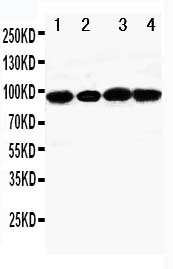Anti-MCM4 Antibody
- SPECIFICATION
- CITATIONS
- PROTOCOLS
- BACKGROUND

Application
| WB |
|---|---|
| Primary Accession | P33991 |
| Host | Rabbit |
| Reactivity | Human, Mouse, Rat |
| Clonality | Polyclonal |
| Format | Lyophilized |
| Description | Rabbit IgG polyclonal antibody for DNA replication licensing factor MCM4(MCM4) detection. Tested with WB in Human;Mouse;Rat. |
| Reconstitution | Add 0.2ml of distilled water will yield a concentration of 500ug/ml. |
| Gene ID | 4173 |
|---|---|
| Other Names | DNA replication licensing factor MCM4, 3.6.4.12, CDC21 homolog, P1-CDC21, MCM4, CDC21 |
| Calculated MW | 96558 MW KDa |
| Application Details | Western blot, 0.1-0.5 µg/ml, Human, Mouse, Rat |
| Subcellular Localization | Nucleus . |
| Protein Name | DNA replication licensing factor MCM4 |
| Contents | Each vial contains 5mg BSA, 0.9mg NaCl, 0.2mg Na2HPO4, 0.05mg Thimerosal, 0.05mg NaN3. |
| Immunogen | A synthetic peptide corresponding to a sequence at the C-terminus of human MCM4(815-829aa TPALKYQQLFEDIRG), identical to the related rat and mouse sequences. |
| Purification | Immunogen affinity purified. |
| Cross Reactivity | No cross reactivity with other proteins |
| Storage | At -20˚C for one year. After r˚Constitution, at 4˚C for one month. It˚Can also be aliquotted and stored frozen at -20˚C for a longer time.Avoid repeated freezing and thawing. |
| Sequence Similarities | Belongs to the MCM family. |
| Name | MCM4 (HGNC:6947) |
|---|---|
| Synonyms | CDC21 |
| Function | Acts as a component of the MCM2-7 complex (MCM complex) which is the replicative helicase essential for 'once per cell cycle' DNA replication initiation and elongation in eukaryotic cells. Core component of CDC45-MCM-GINS (CMG) helicase, the molecular machine that unwinds template DNA during replication, and around which the replisome is built (PubMed:16899510, PubMed:25661590, PubMed:32453425, PubMed:34694004, PubMed:34700328, PubMed:35585232, PubMed:9305914). The active ATPase sites in the MCM2-7 ring are formed through the interaction surfaces of two neighboring subunits such that a critical structure of a conserved arginine finger motif is provided in trans relative to the ATP-binding site of the Walker A box of the adjacent subunit. The six ATPase active sites, however, are likely to contribute differentially to the complex helicase activity (PubMed:16899510, PubMed:25661590, PubMed:32453425, PubMed:9305914). |
| Cellular Location | Nucleus. Chromosome. Note=Associated with chromatin before the formation of nuclei and detaches from it as DNA replication progresses. |

Thousands of laboratories across the world have published research that depended on the performance of antibodies from Abcepta to advance their research. Check out links to articles that cite our products in major peer-reviewed journals, organized by research category.
info@abcepta.com, and receive a free "I Love Antibodies" mug.
Provided below are standard protocols that you may find useful for product applications.
Background
MCM4(MINICHROMOSOME MAINTENANCE, S. CEREVISIAE, HOMOLOG OF, 4), also called CDC21, S. POMBE, HOMOLOG OF, is a protein that in humans is encoded by the MCM4 gene. MCM4 is one of the highly conserved mini-chromosome maintenance proteins(MCM) that are essential for the initiation of eukaryotic genome replication. The MCM4 gene is mapped to 8q11.21. The 864-amino acid MCM4 protein has an observed molecular mass of 97 kD by SDS-PAGE, which is similar to its calculated molecular mass of 96.6 kD. Western blot analysis with and without phosphatase treatment suggested that MCM4 is highly phosphorylated in mitotic cells. In the absence of DDK, CDK phosphorylation at the distal part of the Mcm4 NSD becomes crucial.MCM4 encodes a subunit of the MCM2-7 complex(also known as MCM2-MCM7), the replication licensing factor and presumptive replicative helicase.
If you have used an Abcepta product and would like to share how it has performed, please click on the "Submit Review" button and provide the requested information. Our staff will examine and post your review and contact you if needed.
If you have any additional inquiries please email technical services at tech@abcepta.com.













 Foundational characteristics of cancer include proliferation, angiogenesis, migration, evasion of apoptosis, and cellular immortality. Find key markers for these cellular processes and antibodies to detect them.
Foundational characteristics of cancer include proliferation, angiogenesis, migration, evasion of apoptosis, and cellular immortality. Find key markers for these cellular processes and antibodies to detect them. The SUMOplot™ Analysis Program predicts and scores sumoylation sites in your protein. SUMOylation is a post-translational modification involved in various cellular processes, such as nuclear-cytosolic transport, transcriptional regulation, apoptosis, protein stability, response to stress, and progression through the cell cycle.
The SUMOplot™ Analysis Program predicts and scores sumoylation sites in your protein. SUMOylation is a post-translational modification involved in various cellular processes, such as nuclear-cytosolic transport, transcriptional regulation, apoptosis, protein stability, response to stress, and progression through the cell cycle. The Autophagy Receptor Motif Plotter predicts and scores autophagy receptor binding sites in your protein. Identifying proteins connected to this pathway is critical to understanding the role of autophagy in physiological as well as pathological processes such as development, differentiation, neurodegenerative diseases, stress, infection, and cancer.
The Autophagy Receptor Motif Plotter predicts and scores autophagy receptor binding sites in your protein. Identifying proteins connected to this pathway is critical to understanding the role of autophagy in physiological as well as pathological processes such as development, differentiation, neurodegenerative diseases, stress, infection, and cancer.


